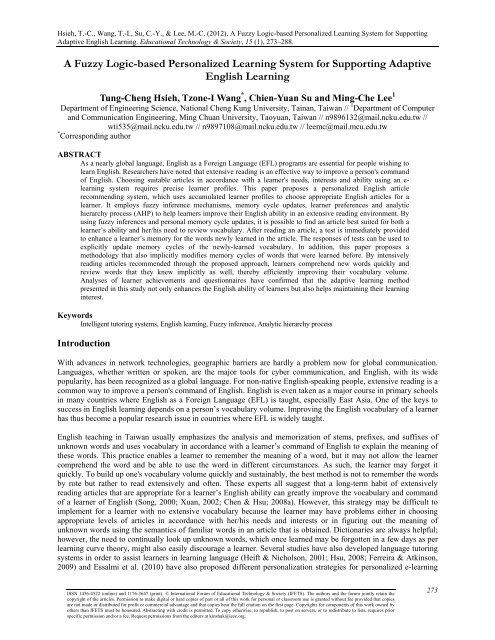January 2012 Volume 15 Number 1 - Educational Technology ...
January 2012 Volume 15 Number 1 - Educational Technology ...
January 2012 Volume 15 Number 1 - Educational Technology ...
You also want an ePaper? Increase the reach of your titles
YUMPU automatically turns print PDFs into web optimized ePapers that Google loves.
Hsieh, T.-C., Wang, T.-I., Su, C.-Y., & Lee, M.-C. (<strong>2012</strong>). A Fuzzy Logic-based Personalized Learning System for Supporting<br />
Adaptive English Learning. <strong>Educational</strong> <strong>Technology</strong> & Society, <strong>15</strong> (1), 273–288.<br />
A Fuzzy Logic-based Personalized Learning System for Supporting Adaptive<br />
English Learning<br />
Tung-Cheng Hsieh, Tzone-I Wang * , Chien-Yuan Su and Ming-Che Lee 1<br />
Department of Engineering Science, National Cheng Kung University, Tainan, Taiwan // 1 Department of Computer<br />
and Communication Engineering, Ming Chuan University, Taoyuan, Taiwan // n9896132@mail.ncku.edu.tw //<br />
wti535@mail.ncku.edu.tw // n9897108@mail.ncku.edu.tw // leemc@mail.mcu.edu.tw<br />
* Corresponding author<br />
ABSTRACT<br />
As a nearly global language, English as a Foreign Language (EFL) programs are essential for people wishing to<br />
learn English. Researchers have noted that extensive reading is an effective way to improve a person's command<br />
of English. Choosing suitable articles in accordance with a learner's needs, interests and ability using an elearning<br />
system requires precise learner profiles. This paper proposes a personalized English article<br />
recommending system, which uses accumulated learner profiles to choose appropriate English articles for a<br />
learner. It employs fuzzy inference mechanisms, memory cycle updates, learner preferences and analytic<br />
hierarchy process (AHP) to help learners improve their English ability in an extensive reading environment. By<br />
using fuzzy inferences and personal memory cycle updates, it is possible to find an article best suited for both a<br />
learner’s ability and her/his need to review vocabulary. After reading an article, a test is immediately provided<br />
to enhance a learner’s memory for the words newly learned in the article. The responses of tests can be used to<br />
explicitly update memory cycles of the newly-learned vocabulary. In addition, this paper proposes a<br />
methodology that also implicitly modifies memory cycles of words that were learned before. By intensively<br />
reading articles recommended through the proposed approach, learners comprehend new words quickly and<br />
review words that they knew implicitly as well, thereby efficiently improving their vocabulary volume.<br />
Analyses of learner achievements and questionnaires have confirmed that the adaptive learning method<br />
presented in this study not only enhances the English ability of learners but also helps maintaining their learning<br />
interest.<br />
Keywords<br />
Intelligent tutoring systems, English learning, Fuzzy inference, Analytic hierarchy process<br />
Introduction<br />
With advances in network technologies, geographic barriers are hardly a problem now for global communication.<br />
Languages, whether written or spoken, are the major tools for cyber communication, and English, with its wide<br />
popularity, has been recognized as a global language. For non-native English-speaking people, extensive reading is a<br />
common way to improve a person's command of English. English is even taken as a major course in primary schools<br />
in many countries where English as a Foreign Language (EFL) is taught, especially East Asia. One of the keys to<br />
success in English learning depends on a person’s vocabulary volume. Improving the English vocabulary of a learner<br />
has thus become a popular research issue in countries where EFL is widely taught.<br />
English teaching in Taiwan usually emphasizes the analysis and memorization of stems, prefixes, and suffixes of<br />
unknown words and uses vocabulary in accordance with a learner’s command of English to explain the meaning of<br />
these words. This practice enables a learner to remember the meaning of a word, but it may not allow the learner<br />
comprehend the word and be able to use the word in different circumstances. As such, the learner may forget it<br />
quickly. To build up one's vocabulary volume quickly and sustainably, the best method is not to remember the words<br />
by rote but rather to read extensively and often. These experts all suggest that a long-term habit of extensively<br />
reading articles that are appropriate for a learner’s English ability can greatly improve the vocabulary and command<br />
of a learner of English (Song, 2000; Xuan, 2002; Chen & Hsu; 2008a). However, this strategy may be difficult to<br />
implement for a learner with no extensive vocabulary because the learner may have problems either in choosing<br />
appropriate levels of articles in accordance with her/his needs and interests or in figuring out the meaning of<br />
unknown words using the semantics of familiar words in an article that is obtained. Dictionaries are always helpful;<br />
however, the need to continually look up unknown words, which once learned may be forgotten in a few days as per<br />
learning curve theory, might also easily discourage a learner. Several studies have also developed language tutoring<br />
systems in order to assist learners in learning language (Heift & Nicholson, 2001; Hsu, 2008; Ferreira & Atkinson,<br />
2009) and Essalmi et al. (2010) have also proposed different personalization strategies for personalized e-learning<br />
ISSN 1436-4522 (online) and 1176-3647 (print). © International Forum of <strong>Educational</strong> <strong>Technology</strong> & Society (IFETS). The authors and the forum jointly retain the<br />
copyright of the articles. Permission to make digital or hard copies of part or all of this work for personal or classroom use is granted without fee provided that copies<br />
are not made or distributed for profit or commercial advantage and that copies bear the full citation on the first page. Copyrights for components of this work owned by<br />
others than IFETS must be honoured. Abstracting with credit is permitted. To copy otherwise, to republish, to post on servers, or to redistribute to lists, requires prior<br />
specific permission and/or a fee. Request permissions from the editors at kinshuk@ieee.org.<br />
273

















